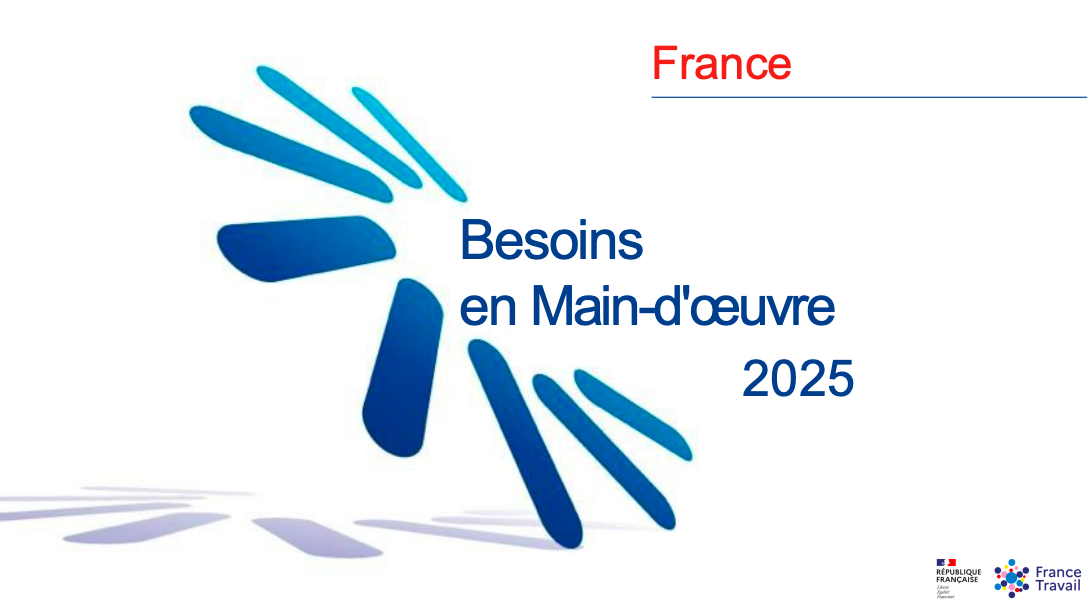BMO 2025 survey: Recruiting on permanent contracts, a strategic challenge for companies
.jpg alt=)
The challenges of open-ended recruitment in 2025: Analysis and solutions
In a changing job market, the "Besoins en Main-d'Œuvre" (BMO) 2025 reveals a significant underlying trend: while the overall volume of recruitments is down by 12.5% compared to 2024, the share of open-ended contracts in hiring plans is up significantly (+5.5 points) to 43.8%. This trend reflects a deep transformation in the HR strategies of French companies, which now favor stability and the retention of talent in the face of an uncertain economic context.
"This trend towards more permanent contracts against a backdrop of an overall slowdown in recruitment is not a contradiction, but rather a strategic adjustment", explains a Human Resources Director."Companies are looking to secure their key skills in an uncertain economic environment, even if it means reducing the overall volume of hiring."
HR trends, training, key recruitment figures... Alphéa Conseil previews all the latest news!Follow us on LinkedIn |
A revealing paradox: fewer hires but more permanent contracts
The overall drop in recruitment projects (2.43 million in 2025 versus almost 2.8 million in 2024) is accompanied by an increase in the proportion of permanent contracts. This paradoxical trend can be explained by several factors:
- Securing strategic skills: faced with persistent recruitment difficulties (50.1% of projects deemed difficult), companies are seeking to stabilize their key workforce.
- The changing balance of power: the reduction in the overall volume of hiring mechanically reduces the tension on certain positions, enabling employers to offer more permanent contracts to attract the best profiles.
- Anticipating future needs: companies take a more forward-looking view of their skills needs, encouraging investment in long-term human capital.
Tensioned sectors: where are the difficulties concentrated?
Sectoral analysis of difficult CDI recruitment highlights several areas of persistent tension, despite the general decline in hiring volume:
Industry (-16.5%)
While the industrial sector is experiencing a sharp drop in recruitment projects, qualified permanent positions remain particularly difficult to fill. Companies such as Schneider Electric or Saint-Gobain testify to recurring difficulties in attracting specialized technical profiles (industrial maintenance, automation engineers, etc.) despite upgraded salary packages.
"Even though we offer attractive salaries and prospects for career development, we are still struggling to recruit certain specialized technical profiles", confides a Recruitment Manager "The lack of technical skills in the market is forcing us to completely rethink our talent acquisition strategy."
Construction (-22%)
The construction sector, heavily impacted by the real estate crisis, nevertheless maintains critical CDI needs for certain trades. Groups such as Bouygues Construction or Eiffage are struggling to recruit qualified site supervisors or foremen, essential to the management of their large-scale projects.
Business services (-15.2%)
Despite the overall market contraction, companies like Capgemini or Sopra Steria continue to actively search for IT and digital profiles en CDI, with difficulty rates often exceeding 70% for specialized developers or cybersecurity experts.
|
|
|
|
Innovative strategies for overcoming obstacles
In the face of these challenges, the most successful companies deploy innovative approaches:
"Augmented"
employer brandingOrganizations that stand out are no longer content with conventional HR communications, but are developing a differentiating employer value proposition. Decathlon, for example, has considerably boosted its attractiveness by promoting its internal mobility policy and environmental commitment, reducing its recruitment difficulties for technical positions on permanent contracts by 30%.
"We have completely rethought our approach to employer branding in 2024", reveals an HR Manager. "Beyond the classic benefits, we now highlight our societal and environmental impact, as well as international career opportunities. The results are spectacular: we've cut our recruitment times by a third on permanent technical positions."
Tailor-made integration paths
Companies like Michelin or L'Oréal have thoroughly overhauled their onboarding processes, creating personalized pathways that secure new employees' first few weeks and significantly reduce early turnover, often a problem in shortage positions.
The "skills first"
approachThe skills revolution is transforming recruitment practices. Companies like Orange or La Poste have adopted selection methods based primarily on behavioral and technical skills rather than diplomas or linear career paths, thus broadening their pool of potential candidates.
Company academies
Faced with a lack of technical skills (cited by 52% of recruiters), in-house training is becoming strategic. Groups such as LVMH (with its Institut des Métiers d'Excellence) or Thales develop their own training schemes, guaranteeing a perfect match between the skills developed and their specific needs.
"Our in-house academy has become a real competitive advantage", says Alexandre Dubois, CEO. "Instead of fighting in a tight market for rare skills, we now prefer to identify potential and train them to our standards. Not only does this solve our recruitment problem, it also boosts our retention rate."
Towards a more integrated approach to recruitment
In-depth analysis of the BMO 2025 survey reveals thatperforming companies in permanent recruitment are adopting a systemic vision that goes beyond simple talent acquisition. They closely articulate:
Business strategy and HR strategy : by precisely aligning their skills needs with their medium-term strategic orientations Internal mobility policy : by promoting progressive career paths as a lever for loyalty Continuing training: investing heavily in skills development |
This integrated approach not only reduces recruitment difficulties, but also optimizes team commitment and performance over time.
"The companies that are most successful at recruiting permanent staff are those that have stopped thinking in silos",observes Claire, Talent Acquisition Director."At our company, recruitment is no longer the sole concern of HR, but a strategic concern that involves operational staff at all levels. This cross-functional vision enables us to anticipate our needs and prepare our talent pools well in advance."
It's up to you to turn constraints into opportunities
Faced with the challenges highlighted by the BMO 2025 survey, companies can no longer be content with conventional approaches to recruitment. At Alphéa Conseil, we support organizations in this transformation by offering a unique methodology that integrates predictive needs analysis, overhaul of acquisition processes, and tailored skills development strategies. Our expert consultants, backed by in-depth sector-specific experience, help you deploy pragmatic and innovative solutions to overcome permanent recruitment difficulties and transform your HR constraints into genuine performance levers. In a constantly changing market, choose a strategic partner who understands the specific challenges of your sector and supports you in building an HR strategy aligned with your business objectives.

Discover our services!
|





